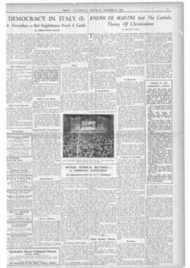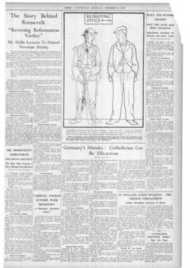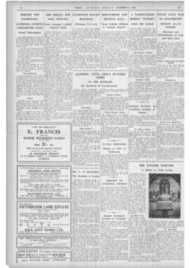Page 2, 13th November 1936
Page 2

Report an error
Noticed an error on this page?If you've noticed an error in this article please click here to report it.
Tags
Share
Related articles
London Celebrates Social Encyclical
Dorothy Sayers:
Rerum Novarum In The Niteries
New Order Will Depend Onl Right Relationship Between...
The Time Is Coming Again When It Will Be Counted A Public...
RE-READING OF RERUM
NO VARUM Platitudes Or Explosives ?
FIRST AID FOR STUDENTS
By Our Industrial Correspondent What is the experience of most people when they first read the Encyclical Rerun Novarum? Let us be quite frank. If we are speaking of the present generation it is probable that the great majority of those with keen social sympathies feel, when reading this encyclical for the first time, a certain disappointment.
A Personal Experience
To quote a personal experience, when I first read it, as a fairly recent convert who
had previously been a social worker for a good many years, I was considerably disappointed; and I have a strong impression that many others have in their hearts felt the same. It is certainly a common complaint that the encyclical contains nothing that will " cut any ice " at a street corner meeting in a working class district, and when Catholics wish to impress others with the radical attitude of the Church in social and economic questions their quotations, with one or two exceptions, are nearly always from Quadragesimo Anno.
But whose fault is this, the encyclical's Or the reader's'? Speaking for myself again, I found my first impressions considerably modified at subsequent readings some years later, and a few days ago I had occasion to ask myself rather definitely where the truth lay. Here, in brief, is the answer that I gave, set down on paper for the benefit of others who have been secretly troubled in the same way.
Historical Changes
In the first place, part of the difficulty in appreciating the originality and forcefulness of Reruni Novarum is due to historical changes. Most readers to-day are simply ignorant of the circumstances in which it was issued and which made it so startling.
The dominant political creed was then Liberalism which had formed the minds not only of non-Catholics but of great numbers of Catholics as well. It was the creed of the vast majority of those who called themselves progressive for it had not yet become fashionable, or even quite respectable to call oneself a Socialist.
The first shock, therefore. inflicted by Rerum Novarum was that someone who was not a Socialist made Liberalism answerable for most of the contemporary miseries of the working classes.
Isolated pamphleteers and philanthropists or paradoxical politicians had done it before but now tw less a personage than the Pope, appealing to the whole Catholic tradition, was attacking Liberalism not in the name of reaction but on behalf of the workers.
The Attack on Liberalism
He was in the strongest language pointing out the cruel consequences of the Liberal doctrine of laisser faire which meant unregulated economic competition in which the worker with his inferior bargaining power was practically at the mercy of the capitalist.
The highest moral authority in the world was roundly condemning wage contracts made on Liberal principles as subjecting the worker to " force and injustice."
The almost complete disappearance of organised political Liberalism in our own day makes it difficult for us to realise now the sensational character on this onslaught. We can gather something from the emphasis laid in Quadragesimo Anno on the part played by the earlier encyclical in the destruction of the tenets of Liberalism, " which had long hampered effective interference by the Government."
Attitude Towards Property
But the relation of Rerurn Novartun to Socialism was even more astonishing at the time of its publication. For, in the first place, in demolishing Socialism's central
doctrine it did not defend the rights of property owners in the abstract terms dear to plutocrats which allow them to over-ride the rights of others and the very purposes of property itself, but expounded a reasoned philosophy of property that related it to human personality and needs, particularly to those of the workers.
Furthermore, it insisted that it should be distributed among them as widely as possible, thereby putting the institution in what at that time was an entirely new light.
State Action Urged In the second place, it was stated emphatically that the State had many social and economic duties to perform, duties of a kind that the public opinion of the day almost unanimously called Socialistic. For they involved State interference (when necessary) with countless economic contracts that no Liberal could conceive anyone but a Socialist wanting to interfere with.
It is almost impossible for us who live at a time when State regulation in ten thousand details of social and economic life is on the programme of every political party to realise how extraordinary that part of the encyclical must have sounded coming from the Pope.
Principles Meant to be Applied
But it would be a great mistake to attribute the apparent " tameness " of Rerun Novarurn to-day solely to the passage of time and the fact that part of what it stood for has been accomplished. The fundamental cause of our first disappointment with the Encyclical, if we have radical tendencies, or our complacency over it. if we are conservative, is something quite independent of the generation to which we happen to belong.
It is our failure to think of the principles it lays down as a programme to be carried out or to realise the consequences of carrying them out.
We arc accustomed to hear pious sentiments expressed about social and economic betterment by those who will do nothing to alter the root conditions that are doing the , damage, Consequently we almost automatically dismiss statements of moral principle as something merely for the copybook or the c'ateehism," and nof
the market-place, What Applying Them Would Mean
This applies most obviously to the precepts in the earlier sections of the encyclical when the individualeluties of employers and employed are laid down and the part to be played by the Church is described. Most of them are familiar to anyone who has had any decent religious education but they are familiar to him only in connection with his school or catechism classes, not in connection with his industrial or business life.
It is practically impassible for him to realise at his first reading of the encyclical that Pope Leo XIII seriously meant them to be applied to industrial and business life or to grasp the terrific consequences of applying them.
Very much the same is true of what is said in the later sections of the encyclical concerning the principles on which the State ought to act in social and economic matters in a fallen world. We are simply not in the habit of thinking of the State as legislating on moral principles.
We have become so materialistic that almost our only standard for judging the importance of State action is by its size, as measured, say, by the number of officials it employs or of poor men it regiments or of regulations it imposes or of pounds, shillings and pence it distributes. To think primarily in terms of the moral rights that it should protect and enforce is so alien to us that a severe mental effort is needed to connect the two things.
The Moral Duties of the State
Consequently what is said in the encyclical about the moral obligations of the State easily passes us by as pious platitudes with no actual bearing on political programmes and we fail to see what a revolution would take place if the State really made it its business to fulfil these obligations, which is the tremendous programme the Pope proposes.
Here are some of the obligations to be fulfilled.
Private property is to be protected and the widest possible distribution of it promoted by legislation.
Strikes, when they proceed from real grievances, should be forestalled by remedial legislation.
Steps should be taken to ensure that every wage contract provides for a just wage permitting a decent standard of living and also such leisure for soul and body as is fitting for beings made after God's image. Any agreement to the contrary is to be treated as obtained by f orce.
A Revolutionary Programme
It is possible that if you think of these duties as beginning and ending with a Catechism class or even a study circle you will still wonder what all the fuss over Rerum Novarum is about. But think of them as something that should have been included in the King's speech as the basis for the legislation of the coming session and you will realise that a revolution could be effected in 1936 merely by catching up with what the Pope was saying in 1891. After that there is Quadragesimo Anno to come and all that it has to say about controlling the money-power.
blog comments powered by Disqus

















